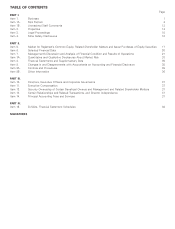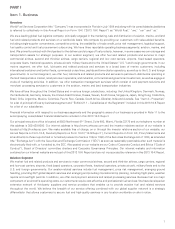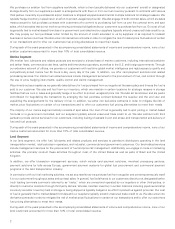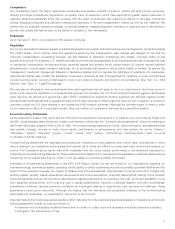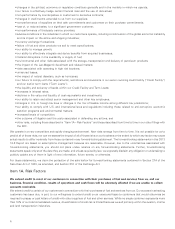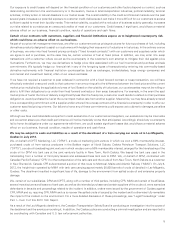World Fuel Services 2013 Annual Report Download - page 14
Download and view the complete annual report
Please find page 14 of the 2013 World Fuel Services annual report below. You can navigate through the pages in the report by either clicking on the pages listed below, or by using the keyword search tool below to find specific information within the annual report.We also enter into proprietary derivative transactions, primarily intended to capitalize on arbitrage opportunities associated with basis
or time spreads related to fuel products we sell. Proprietary derivative transactions, by their nature, entail exposure to adverse changes
in commodity prices in relation to our proprietary position. Although we have established limits on such exposure, any such adverse
changes could result in losses. The risks we face because of our use of financial derivatives can be exacerbated by volatility in the
financial and other markets. In addition, we may fail to adequately hedge our risks or could otherwise incur losses if our employees fail
to comply with our policies and procedures with respect to hedging or proprietary trading, for example by engaging in unauthorized
trading activity or failing to hedge a specific financial risk or observe limits on exposure, which could subject us to financial losses that
would have a material adverse effect on our business, financial condition, results of operations and cash flows.
Finally, the majority of our derivatives are not designated as cash flow hedges for accounting purposes, and we therefore recognize
changes in the fair market value of these derivatives as a component of revenue or cost of revenue (based on the underlying
transaction type) in our consolidated statements of income and comprehensive income. Since the fair value of these derivatives are
marked to market at the end of each quarter, changes in the fair value of our derivative instruments as a result of gains or losses may
cause our earnings to fluctuate from period to period.
If we fail to comply with laws or other government regulations applicable to our operations, we could suffer penalties
or costs that could have a material adverse effect on our business.
We are required to comply with extensive and complex laws and other regulations at the international, federal, state and local
government levels relating to, among other things:
• the transportation and handling of fuel and fuel products;
• the operation of fuel storage and distribution facilities;
• workplace safety;
• fuel spillage or seepage;
• environmental protection;
• consumer and data protection;
• regulatory reporting requirements; and
• hazardous waste disposal.
If we fail to comply with these laws or regulations, we could be subject to substantial fines or penalties or to civil or criminal liability. In
addition, compliance with existing and future laws regulating the delivery of fuel by barge, truck or railcar, fuel storage terminals and
underground storage tanks that we own or operate may require significant capital expenditures and increased operating and
maintenance costs. Any significant fines and costs incurred as a result of such regulations could have a material adverse effect on our
business and results of operations.
Reduced sales to our government customers could adversely affect our profitability.
As a result of complex logistics and extended payment terms for our government customers, sales of products and services to such
customers generally carry higher margins than sales to other customers. U.S. government budget constraints and the scheduled
withdrawal of armed forces from Afghanistan are expected to result in a decrease in defense spending, which in turn could cause a
significant reduction in sales and related profit in our government services business. Furthermore, profitability associated with our
government services business may fluctuate significantly from time to time as a result of the commencement, extension or
completion of existing and new government contracts. Accordingly, a decrease in government sales could contribute
disproportionately to a reduction in our gross margin and profitability and such decrease could be sudden. Therefore, the loss of a
significant government customer or a material reduction in sales to government customers could adversely affect our business,
financial condition, results of operations and cash flows.
Our business is dependent on the ability to obtain financing to meet our capital requirements and fund our future
growth, which may be particularly difficult to obtain if there is volatility in the credit or capital markets.
We rely on credit arrangements with banks, suppliers and other parties as a significant source of liquidity for capital requirements not
satisfied by operating cash flow. Any inability to obtain credit as and when we need it on commercially reasonable terms or at all, such
as in the event there is a substantial tightening of the global credit markets or a significant reduction in supplier trade credit, could have
a negative impact on our business, financial condition, and cash flows, as well as our future development and growth. Furthermore, if
we are unable to obtain debt financing and instead raise capital through an equity issuance, existing shareholders would be diluted.
Even if we are able to obtain debt financing, the restrictions creditors may place on our operations and our increased interest expense
and leverage could limit our ability to grow.
8



